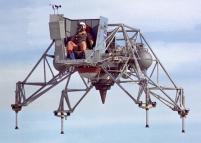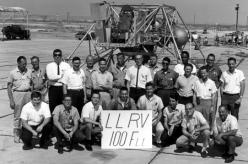|

|
|
Fig. 1 - The Lunar Landing Research Vehicle flying at
Dryden Flight Research Center. (NASA: ECN-1606)
|
|
|
 The lunar landing
training vehicle (LLTV) was just like the lunar module, and it was too unstable to
fly. Neil Armstrong had to eject because he couldn't control
it. The lunar landing
training vehicle (LLTV) was just like the lunar module, and it was too unstable to
fly. Neil Armstrong had to eject because he couldn't control
it.
Two vehicles were built to train the Apollo astronauts to fly the
lunar module. The Lunar Landing Research Vehicles (LLRV) was designed
at NASA's Dryden Flight Research Center. Bell Aircraft produced and
delivered two of them to NASA. The lessons learned from these
vehicles were applied toward the more advanced Lunar Lander Training
Vehicles (LLTV), three of which were built.
LLRV no. 1, piloted by Neil Armstrong, crashed in May 1968 when
the helium pressurization system for the steering jets failed, leaving
Armstrong no way to control the vehicle. This was not because the
vehicle was too unstable to control, or because Armstrong was a poor
pilot. This is like driving your car down the freeway and having the
steering wheel come off in your hands. You will crash in that
situation, and it's not because cars (in general) can't be steered --
it's because a mechanical failure caused your car to lose
control in that particular instance.

|
|
Fig. 2 - The LLRV team poses by one of the aircraft in
conjunction with the 100th successful flight. (NASA:
E-14754)
|
|
|
There were two other crashes: two of the LLTVs crashed, one in
December 1968 and the other in January 1971. These too were caused by
technical failures. They used state-of-the-art fly-by-wire
technology, and it did not always work perfectly. This is why the
vehicles were equipped with ejection seats.
By April 1966 the LLRV had already performed more than 100
successful flights (Fig. 2). Conspiracists generally refer only to
Armstrong's crash and imply that this was the typical outcome of an
LLRV flight. On the contrary, the typical outcome was a safe,
successful landing. A fleet of experimental aircraft that can perform
hundreds of times over several years with only three serious crashes
is not inherently dangerous, unstable, or unflyable. To imply
otherwise is to ignore a great deal of fact.
It is important to understand that these vehicles were not
built as prototypes for the lunar module. A prototype is built to
test the technology that will go into the final version,
whether everything fits together, and to determine how it can be built
on an assembly line. The LLTVs and LLRVs were built to reproduce for
the pilot, as best as could be determined in advance, the
"feel" of flying the lunar module using whatever ad hoc technology had
to be included to do that in an earth environment.


|








 The lunar landing
training vehicle (LLTV) was just like the
The lunar landing
training vehicle (LLTV) was just like the 

